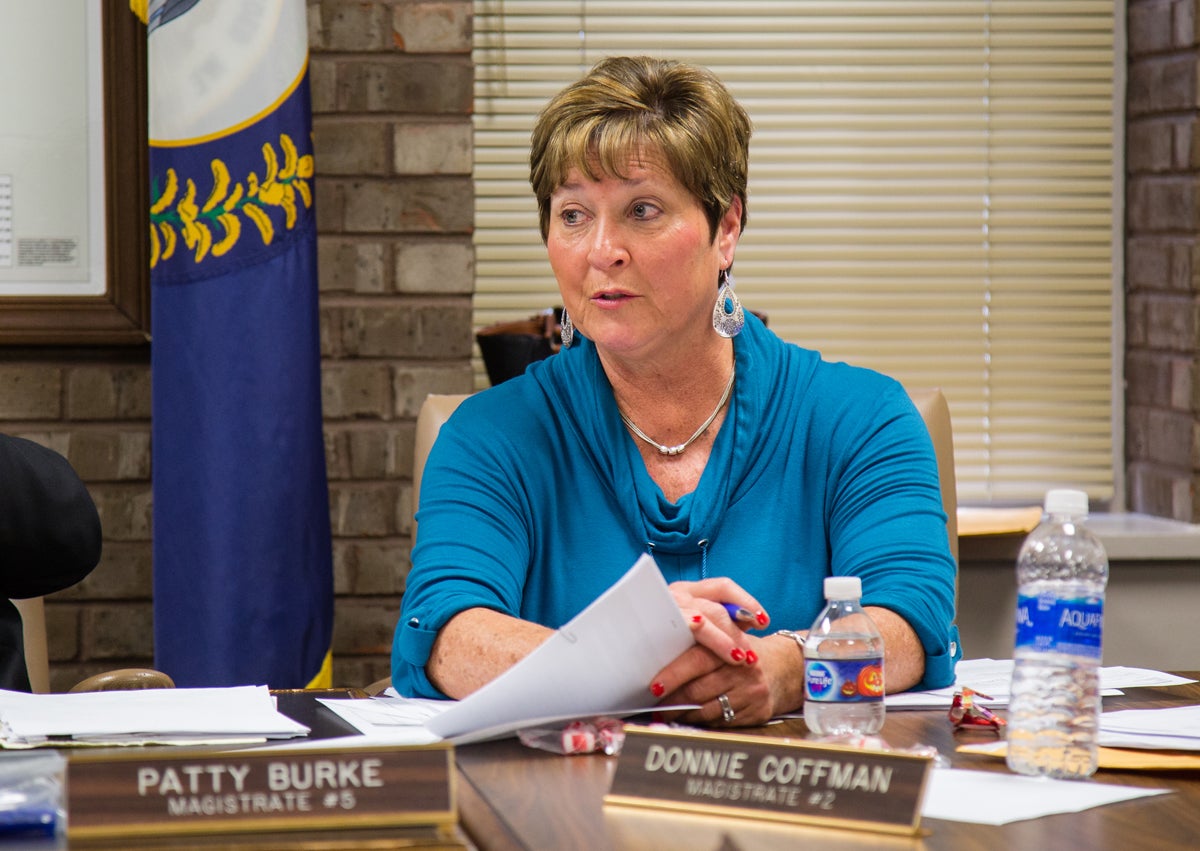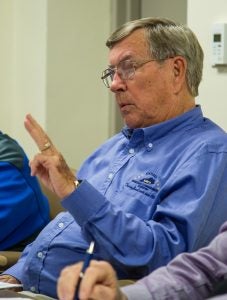Magistrate: ‘Pitiful’ that courts won’t participate on criminal justice council
Published 8:31 am Wednesday, November 15, 2017

- Ben Kleppinger/ben.kleppinger@amnews.com Boyle County Magistrate Patty Burke said she agreed with Magistrate Jack Hendricks that judges need to participate in a new Criminal Justice Coordinating Council in order for it to be effective.
Boyle County Fiscal Court approved the creation of a “criminal justice coordinating council” to work on solutions for the county’s overcrowded, ever-more-expensive jail. But the magistrate chosen to serve on the council says he has serious doubts it can accomplish anything meaningful if local judges and the judicial system won’t participate.

Ben Kleppinger/ben.kleppinger@amnews.com
Boyle County Magistrate Jack Hendricks has been appointed to serve on a new Criminal Justice Coordinating Council for Boyle and Mercer counties, but he said Tuesday the council will be “spinning our wheels” if local judges won’t participate.
“We’ve got 20 people named to a committee — not one of them is from the (Administrative Office of the Courts), the (Department of Corrections), the (Department of Justice) or the judges,” Magistrate Jack Hendricks said. “Those are the people that’s going to make the decisions on anything … if we don’t have any of them interested enough to be on this committee to work with us and fix our problems, I think we’re spinning our wheels.
“I think we’ve got another committee that’s not going to get anywhere without some of these folks that are in charge of the system being willing to step up and listen.”
Hendricks said based on what he’s heard from Treasurer Mary Conley, who worked to assemble the initial list of people to participate on the council, the local judges “have said they’re not going to be involved period.”
“There’s a lot of words I could use, but the worst thing is I think it’s pitiful that they don’t want to be involved in this,” Hendricks said.
Conley told members of the Boyle-Mercer Joint Jail Committee last week that Circuit Judge Darren Peckler was “pretty adamant there would be no (participation)” on the council from local judges and he issued a “blanket directive” against participation.
“He said he wouldn’t allow (local judges) to serve, but I told him I would like to keep them in the loop,” Conley said last week. “So he said as we go through the process, he would be interested in any information that was created through this group.”
Conley said Peckler didn’t want any judges to wind up in a “possibly litigious situation” if the council was sued.
Boyle County Attorney Lynne Dean said at the Joint Jail meeting that Peckler may have a very good reason to avoid participation on the council.
“I think it’s worth having additional conversation,” Dean said at the time. “If nothing else, understanding the specific concerns that he may have.”
Peckler was not immediately available for comment Tuesday. An employee at his Danville office said he would be working in Mercer County all week.
The purpose of the criminal justice coordinating committee (CJCC) is to work with jail consulting firm Brandstetter Carroll to develop a plan for improving the local jail situation. That plan is a long way from solidifying, but could involve new programs designed to reduce recidivism or rehabilitate inmates addicted to drugs; adding treatment beds; expanding the jail; or even building an entirely new facility.
The Boyle County Detention Center, which houses inmates for Boyle and Mercer counties, has a 220-bed capacity, but has been handling inmate populations exceeding 350 on a regular basis for years. This year, the population has exceeded 400 more than once, prompting the creation of an agreement with the Casey County Jail to take prisoners as a kind of emergency relief valve.
The increase in prisoners has coincided with an increase in cost — over the last four years, the jail’s annual budget has risen by more than $1 million, according to jail budget documents produced in early 2017. Boyle County pays for about two-thirds of the jail’s unfunded expenses.
Hendricks said he thinks the CJCC will only “waste time” if the courts won’t get involved.
Magistrate Patty Burke said she agrees with Hendricks.
“If the judicial system is not interested in helping us to not house so many prisoners, to not work with the programs to rehabilitate, then we’re spinning our wheels,” she said.
Many of the solutions the CJCC might consider could involve changes in how defendants are processed through the court system.
Dean said she doesn’t believe the judges aren’t interested in what the CJCC can come up with.
Magistrate John Caywood and Judge-Executive Harold McKinney said they believe the CJCC is needed whether or not the courts participate.
“If there’s a better plan, I’d like to hear it,” Caywood said. “… At least we’re trying to do something. Doing nothing is going to get us where we know we’ll end up.”
“Exactly,” McKinney said. “… One of the things this committee should be doing is advocating for what (Hendricks) is saying. Everybody on this committee should become an advocate for doing things differently and better. The more people you have, the better off you are.”
Caywood made the motion to appoint Hendricks as the fiscal court’s representative on the CJCC and Magistrate Phil Sammons seconded. The vote was unanimous in favor. The fiscal court also voted unanimously to “endorse the concept” of the CJCC.
In addition to a magistrate from Boyle County and a magistrate from Mercer County, the CJCC is planned to include:
• both counties’ judge-executives;
• both counties’ jailers;
• both counties’ attorneys;
• a non-residential treatment representative;
• a Probation and Parole representative;
• a social worker and an attorney from the public defender’s office;
• Ephraim McDowell Health CEO Sally Davenport;
• Kathy Miles with the Boyle County Agency for Substance Abuse Policy;
• Commonwealth’s Attorney Richie Bottoms;
• a victims advocate;
• both counties’ sheriffs; and
• police chiefs from Danville and Harrodsburg.




